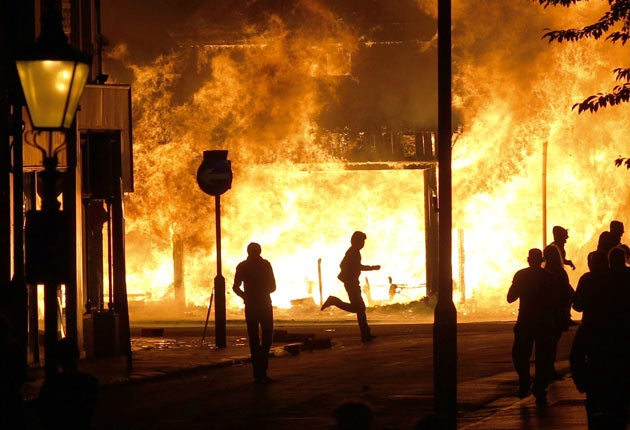Robert Chalmers doesn't like... Young people of today

Are we sufficiently aware of our obligations to a mob? "It is the mob that waits on your table at Starbucks and serves you at Tesco and Asda; that dies for you in Tripoli and Helmand Province. The mob has enabled you to defy the world, and can also defy you, when neglect and calamity have driven them to despair."
That declaration, which I've altered only by amending the detail in the second sentence, was delivered by Lord Byron in his speech to the upper chamber, following the Luddite riots in 1812. "You may call the people a mob," he continued, "but do not forget that the mob too often speaks the sentiments of the people."
Those riots were perpetrated, as ever, mainly by the young, and the causes of the disturbances, Byron asserted, lay far deeper than senior politicians chose to recognise. "In the foolishness of their hearts," he says, referring to the crowd, "they imagined the maintenance and well-doing of the poor were of greater consequence than the enrichment of a few individuals" – an unfortunate misconception "in times like these, when bankruptcy, fraud and felony are found in a station not far beneath that of your lordships."
Byron might have been talking yesterday. Except that the Luddites, protesting against joblessness caused by mechanisation, differed from the crowd that ignited Croydon in one serious respect: they had a point. What's been really bizarre about the 2011 riots, to date at least, is the way that the many teenage participants seem more perplexed by their motivations than anyone. Even though nobody, as one commentator remarked recently, can blame a young person for seething with rage when they're employed to sell trainers that cost more than they earn in a week, while the world remains protective of the financiers whose recklessness has exacerbated the predicament of the poor.
"Judged purely as rioters," one veteran of the student revolution of Paris 1968 told me, "I'd say the English class of 2011 has been impressive in terms of execution, but short on theory and ambition. We fought to occupy the centres of power; they smashed up their local liquor store."
The disorder relating to student loans, of course, has had a clear and immediate focus: the well-being of the demonstrators themselves. If the soundtrack for Sixties revolt was Lennon and McCartney's "All You Need is Love," then for this generation, raised under governments that have legitimised the prevalent culture of contagious greed, a more suitable Beatles anthem might be "I, Me Mine."
Youth has always been selfish, and always viewed anyone over 24 as coming from another, slightly pitiful, planet. One of the great popular misapprehensions is that old people are boring. Any interviewer knows that it's the young, with their limited experience, narcissism and lack of irony, who offer the most daunting challenge. The state of teenager-hood isn't one to which anybody over 30 would choose to be restored. That's because, for all the wonderful attributes of the young (things like energy, enthusiasm, beauty, a sense of immortality and, to quote Cyril Connolly, "swiftness in toiletry") they are, despite the terrifying certainty of their stated opinions, secretly confused and generally unblessed with what is usually termed common sense.
There's a moment in the first radio series of Knowing Me, Knowing You, where a libidinous woman MP remarks: "I wish I was seventeen again," to which Alan Partridge, in one of his occasional moments of accidental insight, replies: "Why?"
The real problem with young people of today is that, in a time of conspicuously inept government, they have woefully neglected their duty to foment purposeful revolt.
What generation (armed with Twitter, Facebook, and smart phones) could have been better placed to organize coherent political resistance, which might or might not involve civil disobedience, and made such an amorphous hash of it? We live in a paradoxical state whereby the most tenaciously engaged activists tend to be old, while the young manifest the kind of acceptance of the political status quo traditionally associated with age.
How many of the kids trashing off-licences in Whalley Range would have enlisted with the International Brigade and set off to fight Franco in 1936? The answer might just possibly be: all of them. Older people have been mithering about the young since the days of Socrates, who complained of their "bad manners, contempt for authority and disrespect for elders. Children," he added, "are now tyrants."
I was lucky enough to be 17 in that golden age when things like theft, GBH, public drunkenness, arson, and street-fighting were utterly unknown in Britain. Life was perfect. We even still had libraries. In one of them – Manchester Central – you were greeted by a brass plaque. "The Younger Generation is Bound to Win," it said. "That's the Way the World Goes on."
Subscribe to Independent Premium to bookmark this article
Want to bookmark your favourite articles and stories to read or reference later? Start your Independent Premium subscription today.

Join our commenting forum
Join thought-provoking conversations, follow other Independent readers and see their replies